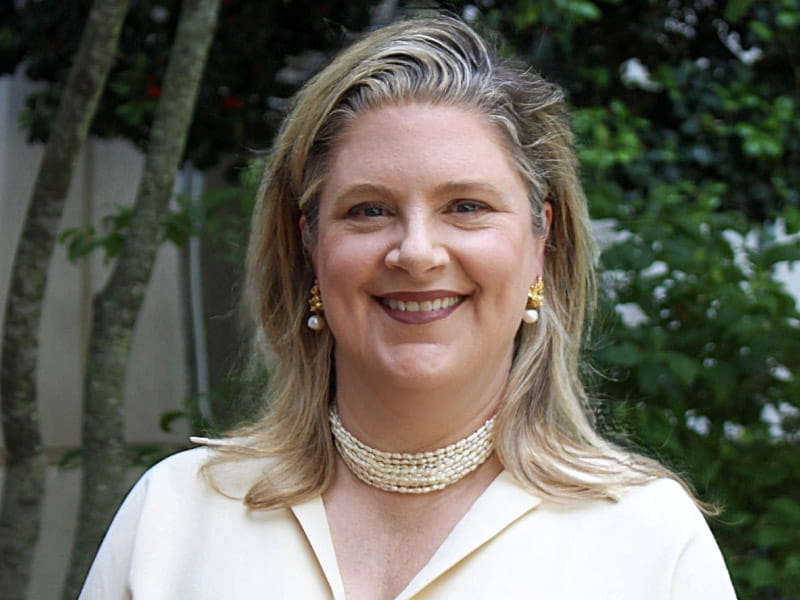Honoree shows communities exceptional dedication through patient care, research

When Dr. Erin Ferranti received the call notifying her she was receiving the American Heart Association's Healthcare Volunteer of the Year Award, she and her husband were in a hospital waiting room while their middle son was having surgery.
"I thought the call was from his surgeon," said Ferranti, assistant professor of nursing at the Nell Hodgson Woodruff School of Nursing at Emory University in Atlanta. "My husband later told me that I said 'You're kidding!' five times. I was really shocked; I couldn't believe it. I'm still speechless."
But to anyone who has ever worked with Ferranti or been under her care, the honor comes as no surprise.
"Your unwavering dedication to improving health outcomes for all makes you exceptionally deserving of this recognition," Nancy Brown, chief executive officer of the American Heart Association, wrote in a letter to Ferranti.
Ferranti will be honored at the association's National Volunteer Awards ceremony in Plano, Texas, on June 17.
By her own assessment, Ferranti is, above all, a nurse, now serving a year-long term as president of the Preventive Cardiovascular Nurses Association. She's also an educator. She's a researcher. And she's director every summer of the Farm Worker Family Health Program.
During what she calls "the best two weeks of my year," often working until 1 in the morning under big tents in produce fields, Ferranti and her 120-member medical team provide health care for more than 1,000 migrant farmworkers and their families in southwest Georgia.
She is determined to be an advocate for farmworkers and their families, for women and for anyone else whose health needs are often overlooked. These roles align perfectly with the mission of the American Heart Association — to be a relentless force for a world of longer, healthier lives.
"AHA is doing such incredible work, tackling some of the biggest issues of the nation's crisis with cardiovascular disease," Ferranti said. "To be involved in that mission, to do that work and be exposed to different patients is so rewarding.
"That's why, whenever the AHA asks me to do something, I always say yes."
Her ongoing research studying the lifestyles of 800 Black women and their children in the Atlanta area, originally a National Institutes of Health study, is now also part of a funded grant within the American Heart Association's Research Goes Red program. It has expanded to look at the gut microbiome (e.g., bacteria and fungi) and lipidome (e.g., fats and oils) as they relate to cardiometabolic outcomes of pregnancy and risk in the months after childbirth.
"Erin has uncovered key factors to engaging and motivating these women and making their health and the health of their families a priority," said Dr. Jennifer Hall, chief of data science for the Heart Association.
Ferranti's volunteering extends to a produce prescription program, in which physicians give prescriptions to patients to eat more fresh fruits and vegetables. Food banks, grocery stores and farmers markets in turn offer produce for free or at a deep discount.
"Anyone who knows Erin has likely heard her introduce herself as a public health nurse — and she truly embodies this title," said Marsha Jones, chairperson of the Board for the American Heart Association. "I admire the empathy, compassion and respect she shows day in and day out, especially for the patients who need her the most."
Ferranti's other AHA projects revolve around maternal health, including being part of a team that writes and puts out evidence-based recommendations for postpartum care.
"More than half of maternal deaths happen postpartum and are largely cardiovascular-related," Ferranti said. "I hope we can move the needle on these. I hope we can set up healthier environments, change policies that make healthier choices easier, and that we have no women dying postpartum."
She realizes that healthier environments aren't always easy to come by. That's why she tries to assume that people are doing their best.
"We live in environments that make unhealthy eating the easier choice, and sedentary behavior the go-to," she said. "The women I work with are working two or three jobs trying to get food on their table," making healthy and affordable choices challenging.
Yet she doesn't lose heart. When her plate seems overflowing and her to-do list impossibly long, she thinks of the farmworker program which, she said, "fills my soul." She remembers the delight in the faces of women she sees as a public health nurse at the "healthy eating extravaganza" she organized when they told her they wanted to connect with other moms.
"Listening to patients is what drives me," said Ferranti, the mother of three sons (including the one whose surgery was a success). "Working with moms and kids, hearing them telling me they feel seen and heard, is what keeps me fighting."
Among her mentors is world-renowned cardiologist Dr. Nanette Wenger of Emory University School of Medicine, who turns 95 this year and continues to be an advocate for women's cardiac care.
"Dr. Wenger is my hero," Ferranti said. "Her pioneering and trailblazing focus on women and heart disease laid the path for all of us who follow. She is so savvy and such a champion of women scientists — truly, an absolute inspiration and legend."
Before falling in love with nursing, Ferranti wanted to be a veterinarian, and she volunteered with an organization that used equine therapy to help kids with special needs. Now, riding her English thoroughbred Winston is her own therapy, as is spending time with the two family dogs, Finnegan and Elsa.
And then Ferranti is back at it, doing what she loves and what she knows is making a difference.
"Volunteering is a great way to meet others who are also doing this," she said. "The work is hard, especially when you're grinding out grants, many of which don't get funded. But volunteering is a reminder of why we keep going."





